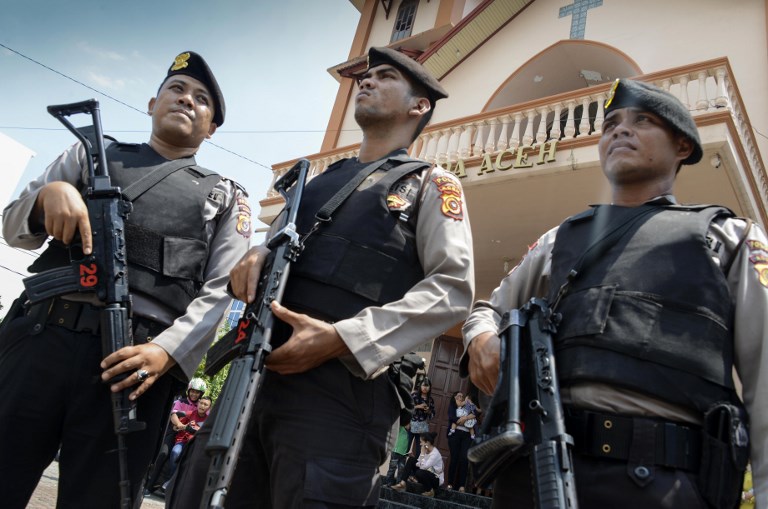Indonesia church attacks kill nine, dozens wounded

Police stand guard outside a church in Banda Aceh on May 13, 2018 following attacks on churches in Surabaya, East Java.
A wave of blasts, including a suicide bombing, struck churches in Indonesia on May 13, killing at least nine and wounding dozens of others in the deadliest attack in years to strike the world’s biggest Muslim-majority country. / AFP PHOTO / CHAIDEER MAHYUDDIN
A wave of blasts, including a suicide bombing, struck churches in Indonesia on Sunday, killing at least nine and wounding dozens of others in the deadliest attack in years to strike the world’s biggest Muslim-majority country.
The Southeast Asian nation, which will begin the holy fasting month Ramadan this week, has been on high alert over attacks by homegrown militants, including some incidents claimed by the Islamic State group.
No one has yet claimed responsibility for the Sunday bombings in Indonesia’s second-biggest city Surabaya.
“Nine people are dead and 40 are in hospital,” East Java Police spokesman Frans Barung Mangera told reporters, adding that two police officers were among the injured.
The official death toll climbed from an initial two killed and may include those who succumbed to injuries in hospital.
Article continues after this advertisementThree separate locations were hit by the bombings around 7:30 a.m. in what appeared to be coordinated attacks that included suicide and possibly vehicle bombings.
Article continues after this advertisementTelevision footage broadcast by major networks appeared to show a motorcycle driver entering the grounds of a church before a bomb was detonated.
Other images displayed a vehicle engulfed in flames at one location.
Police bomb experts were called in to disarm still active explosives at the Gereja Pantekosta Pusat Surabaya (Surabaya Centre Pentacostal Church), with an AFP reporter at the scene hearing two loud explosions.
Images from one scene showed a body lying outside the gate of Santa Maria catholic church and members of Indonesia’s bomb squad poring over the rubble.
At least one of the attackers was killed when they detonated their bomb at Santa Maria. It was not clear if any other perpetrators were among those killed or injured.
“I was frightened… many people were screaming,” 23-year-old witness Roman told AFP after the blast at Santa Maria church.
Police guarded a Sunday mass at another church in the city of Bandung, between the capital Jakarta and Surabaya where the bombings happened.
The attacks come several days after five Indonesian police officers and a prisoner were killed in clashes that saw Islamist inmates take a guard hostage at a high-security jail on the outskirts of Jakarta.
The Islamic State (IS) group claimed responsibility for that incident although police rejected its involvement.
Indonesia’s 260 million people include significant numbers of minority Christians, Hindus and Buddhists but there are concerns over rising sectarian intolerance and militancy.
Indonesian police shot and wounded a man who attacked a church congregation in the town of Sleman with a sword during a Sunday mass in February.
The radical Islamist, who had wanted to fight with the Islamic State group in Syria, injured four people.
High alert
The archipelago nation of some 17,000 islands has long struggled with Islamic militancy and has suffered a series of attacks in the past 15 years — including the 2002 Bali bombings that killed 202 people, mostly foreign tourists, in the country’s worst-ever terror attack.
A sustained crackdown weakened the most dangerous networks but the emergence of IS has proved a potent new rallying cry for radicals.
Hundreds of Indonesians have flocked to fight with IS, sparking fears that extremist outfits back home could get a new lease on life.
A gun and suicide attack in the capital Jakarta left four attackers and four civilians dead in January 2016, and was the first assault claimed by IS in Southeast Asia.
The attack on a district packed with malls, embassies and United Nations offices left around 20 others injured.
Previous incidents have included a 2004 suicide car bomb that killed 10 outside the Australian embassy in Jakarta, twin bomb blasts that killed 22 in a market in the Central Sulawesi town of Tentena, and a suicide bombing in 2005 that left 20 dead in Bali.
Seven people were killed, six of them foreigners, and more than 40 were injured when suicide bombers targeted the luxury Ritz-Carlton and JW Marriott hotels in Jakarta in July 2009.